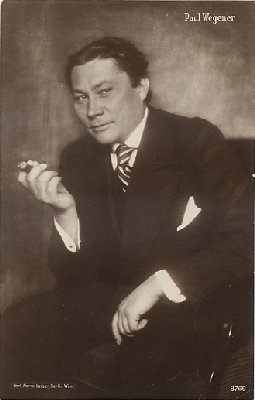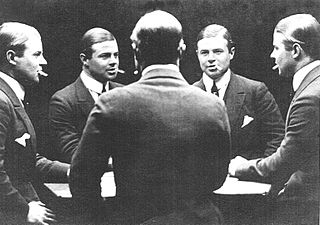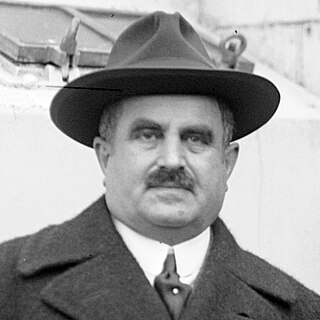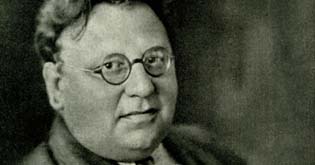
Oskar Messter was a German inventor and film tycoon in the early years of cinema. His firm Messter Film was one of the dominant German producers before the rise of UFA, into which it was ultimately merged.

Pathé is a French major film production and distribution company, owning a number of cinema chains through its subsidiary Pathé Cinémas and television networks across Europe.

Gabriel Leuvielle, known professionally as Max Linder, was a French actor, director, screenwriter, producer, and comedian of the silent film era. His onscreen persona "Max" was one of the first recognizable recurring characters in film. He has also been cited as the "first international movie star" and "the first film star anywhere".

Paul Wegener was a German actor, writer, and film director known for his pioneering role in German expressionist cinema.

Ferdinand Zecca was a pioneer French film director, film producer, actor and screenwriter. He worked primarily for the Pathé company, first in artistic endeavors then in administration of the internationally based company.
Carl Wilhelm, was a prolific German film director, film producer and screenwriter of the silent film era, at the end of which his career apparently entirely faded away and he vanished into obscurity.

Bernard Natan was a French-Romanian film entrepreneur, director and actor of the 1920s and 1930s.

Léonce Joseph Perret was a prolific and innovative French film actor, director and producer. He also worked as a stage actor and director. Often described as avant-garde for his unorthodox directing methods, Perret introduced innovative camera, lighting and film scoring techniques to French cinema.

Erich Pommer was a German-born film producer and executive. Pommer was perhaps the most powerful person in the German and European film industries in the 1920s and early 1930s.

Louis Joseph Gasnier was a French-American film director, producer, screenwriter and stage actor. A cinema pioneer, Gasnier shepherded the early career of comedian Max Linder, co-directed the enormously successful film serial The Perils of Pauline (1914). Gasnier capped his output with the notorious low-budget exploitation film Reefer Madness (1936) which though both a critical and box office failure, became a cult classic.

Albert Capellani was a French film director and screenwriter of the silent era. He directed films between 1905 and 1922. One of his brothers was the actor-sculptor Paul Capellani, and another, film director Roger Capellani.
Fritz Arno Wagner is considered one of the most acclaimed German cinematographers from the 1920s to the 1950s. He played a key role in the Expressionist film movement during the Weimar period and is perhaps best known for excelling "in the portrayal of horror," according to noted film critic Lotte H. Eisner.

René Plaissetty (1889–1955) was an American film director.

Paul Davidson was a German film producer.
Jules Greenbaum was a German pioneering film producer. He founded the production companies Deutsche Bioscope, Deutsche Vitascope and Greenbaum-Film and was a dominant figure in German cinema in the years before the First World War. He is also known for his early experiments with sound films around twenty years before the success of The Jazz Singer made them a more established feature of cinema.

Continental-Kunstfilm GmbH was a short-lived German film production company based in Berlin, formed in February 1912 by Walter Schmidthässler and Max Rittberger. A large number of Continental-Kunstfilm's productions are now probably lost, although some significant films have survived into the 21st century.

Johannes Guter was a Latvian-born German filmmaker, screenwriter, and occasional film producer. Although most of his work is now lost, he is considered a pioneer of German silent cinema and expressionism.

The Weissensee Studios was a collection of separate film production studios located in the Berlin suburb of Weißensee during the silent era.
Decla-Film was a German film production and distribution company of the silent era, founded by Erich Pommer and Fritz Holz in February 1915.

Children's Reformatory is a 1907 French silent short film directed by Charles Decroix, inspired by the eponymous novel by Aristide Bruant.
















